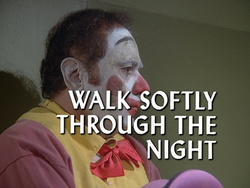Walk Softly Through the Night – Part II (Quincy, M.E.)
| Walk Softly Through the Night – Part II | ||||||||||||||||||||||||||||||||||||||
|---|---|---|---|---|---|---|---|---|---|---|---|---|---|---|---|---|---|---|---|---|---|---|---|---|---|---|---|---|---|---|---|---|---|---|---|---|---|---|

| ||||||||||||||||||||||||||||||||||||||
|
Episode Quote
"You don’t need a degree to care. Just courage." ~ Dr. Quincy
Episode Overview
Walk Softly Through the Night – Part II (Season 3, Episode 15) aired on NBC on **February 8, 1979**. Continuing directly from Part I, Quincy pushes forward with efforts to hold Dr. Colella accountable. The investigation expands to confront institutional apathy, as Quincy navigates bureaucracy and red tape to secure legal action against the corrupt physician. Meanwhile, Marty Herrera begins laying the foundation for a campus drug outreach program with Brock Campbell’s support.
Application of The QME Episode Laws
This episode continues the rigorous application of the four **QME Episode Laws**:
✅ **Law 1 – Seek truth and bring justice:** Quincy testifies before a medical review board and engages the DA to act on Dr. Colella’s case. ✅ **Law 2 – Explore social and ethical issues:** It explores systemic failure to regulate unethical doctors and neglect of addicted youth. ✅ **Law 3 – Tackle sensitive topics respectfully:** The storyline emphasizes healing, accountability, and advocacy for recovery services. ✅ **Law 4 – Maintain forensic accuracy:** Legal medical review procedures and expert testimony illustrate real-world accountability mechanisms.
Episode Synopsis
After confirming Ted Campbell’s overdose and linking it to Dr. Colella’s overprescribing, Quincy brings findings to the county medical board. Despite resistance from legal and professional authorities, he uncovers more victims and secures key testimony. Marty Herrera takes an active role in peer counseling efforts, inspired by Quincy’s commitment. The case concludes with disciplinary action against Colella and the start of real community support programs.
Case File Summary
Victim: Continuation of Ted Campbell case; systemic victims of overprescription. Case #: QME 3.15 / 51092
Medical board testimony, case documentation, and patient interviews confirm patterns of unethical prescription.
Alleged Perpetrator(s) & Additional Victims
- Additional victims: Patients with substance use disorders exploited by unethical medical practice.
- Alleged perpetrator(s): Dr. Mason Colella – charged with gross misconduct and stripped of medical license.
Forensic Science Insight
- Medical records reveal non-therapeutic prescriptions in high-risk combinations.
- Board hearings depict real-life legal-medical procedures.
- Behavioral analysis of prescribing habits contributes to institutional reform.
Themes & Tropes
- **Institutional stonewalling** – Quincy fights bureaucracy to achieve justice.
- **Redemption arc** – Brock Campbell supports prevention efforts in memory of his son.
- **Forensics meets advocacy** – bridging medicine and public policy.
- **Peer-led intervention** – Marty Herrera as emerging youth leader in health education.
Reception & Ratings
IMDb rating: **7.2/10** (1,058 votes)—viewers praised the episode’s resolution, courtroom drama, and inspirational tone, noting a stronger narrative drive than Part I. :contentReference[oaicite:9]{index=9}
Trivia
- The courtroom-style scenes were based on real California medical board proceedings.
- This two-part story was among the first in the series to inspire actual viewer letters urging drug education reform.
Cultural Impact
Part II brings the two-part arc to a close with institutional accountability and hope for reform. It exemplifies the show’s legacy of mixing forensic drama with pressing social commentary—particularly on medical ethics and youth advocacy.
See Also
- Walk Softly Through the Night – Part I (Quincy, M.E.)
- The Law Is a Fool (Quincy, M.E.)
- List of Quincy, M.E. episodes
- QME Ep Laws
- Prescription drug abuse
- Medical board proceedings
